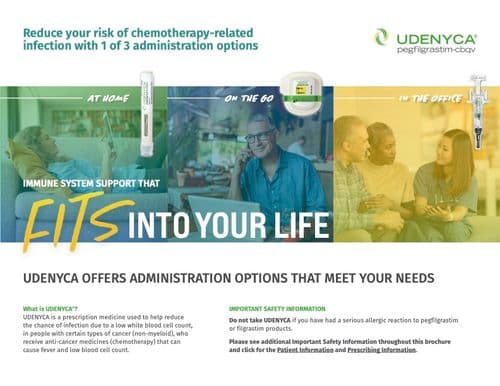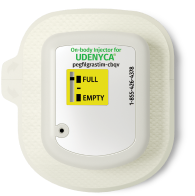Information to help you better understand UDENYCA and biosimilars
Learn about administering treatment with the UDENYCA autoinjector
For complete administration instructions, please see the
autoinjector Instructions for Use.
Learn about receiving treatment with UDENYCA ONBODY™
For complete administration instructions, refer to the
UDENYCA on-body injector Instructions for Use.
Obtenga información sobre la administración del tratamiento con el autoinyector UDENYCA, en español.
Para obtener instrucciones completas de administración,
consulte las Instrucciones de Uso del autoinyector.
Obtenga información sobre cómo recibir tratamiento con UDENYCA ONBODY, en español.
Para obtener instrucciones completas de administración,
consulte las Instrucciones de Uso del inyector corporal
UDENYCA.

Learn about UDENYCA with our Patient Brochure
Get important information about UDENYCA and its 3 administration options.

Un resumen de UDENYCA de nuestro Folleto Para Pacientes en español
Lea un resumen del Folleto Para Pacientes sobre UDENYCA en español.

TSA Disability Notification Card
If you are wearing the UDENYCA on-body injector and plan to travel by plane, present this card at TSA security to ensure a smooth screening process.

Información de Prescripción en español
Lea información importante sobre UDENYCA, incluido qué es, cómo usarlo, y más.

Información para el paciente sobre el autoinyector UDENYCA y la jeringa precargada en español
Lea la información importante para el paciente sobre el autoinyector UDENYCA y la jeringa precargada.

Instrucciones de Uso del autoinyector UDENYCA en español
Aprenda cómo administrar el autoinyector UDENYCA.

Instrucciones de Uso de la jeringa precargada de UDENYCA en español
Aprenda qué esperar con la jeringa precargada de UDENYCA.

Información para el paciente sobre UDENYCA ONBODY en español
Lea la información importante para el
paciente sobre el inyector corporal
UDENYCA.

Instrucciones de Uso de UDENYCA ONBODY en español
Aprenda cómo funciona el inyector corporal UDENYCA.
Frequently asked questions about UDENYCA and biosimilars
UDENYCA is a prescription medicine used to help reduce the chance of infection due to a low white blood cell count, in people with certain types of cancer (non-myeloid), who receive anti-cancer medicines (chemotherapy) that can cause fever and low blood cell count.
Biosimilars are FDA-approved biologic medications that are as safe and effective as the original biologics (known as the reference product). Biosimilars have no clinically meaningful differences from the reference product. This means that there is no compromise in safety and effectiveness of the biosimilar when compared to the reference product. Biosimilars introduce competition into the marketplace and can lower the cost of treatment.
Chemotherapy works by targeting cancerous cells. It can also affect and lower healthy cell counts, including the white blood cells that fight infections.
Do not take UDENYCA if you have had a serious allergic reaction to human G-CSFs, such as pegfilgrastim or filgrastim products.
Before you receive UDENYCA, tell your healthcare provider about all of your medical conditions, including if you have a sickle cell disorder, have kidney problems, are pregnant or plan to become pregnant (it is not known if UDENYCA will harm your unborn baby), are breastfeeding or plan to breastfeed (it is not known if UDENYCA passes into your breast milk).
Tell your healthcare provider about all of the medicines you take, including prescription and over-the-counter medicines, vitamins, and herbal supplements.
The most common side effects of UDENYCA are pain in the bones, arms, and legs. These are not all the possible side effects of UDENYCA. Talk with your doctor about any other side effects. Be sure to review the Patient Information for more side effect information.
UDENYCA provides 3 administration options, so your doctor can prescribe the one that meets your individual needs:
The UDENYCA prefilled autoinjector
Easy to use self-administration from the comfort of your home
The UDENYCA prefilled syringe
Administered in-office by your care team
UDENYCA offers 3 options for administration. Depending on the administration your doctor prescribes, you may need to return to the office or hospital the day after chemotherapy to receive UDENYCA.
The UDENYCA prefilled syringe is typically administered in your doctor’s office by your healthcare team
The UDENYCA autoinjector is typically administered in the comfort of your home, but may also be given by your provider in their office
The UDENYCA on-body injector is set up by your healthcare team the day you receive chemo, and automatically delivers treatment approximately 27 hours later

